

Phantoms in the Brain. The writings of Oliver Sacks and others have shown us that we can learn much about ourselves by looking closely at the deficits shown by people with neurological problems.
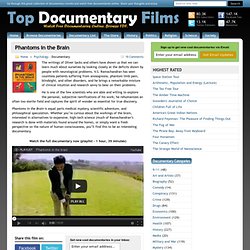
V.S. Ramachandran has seen countless patients suffering from anosognosia, phantom limb pain, blindsight, and other disorders, and he brings a remarkable mixture of clinical intuition and research savvy to bear on their problems. He is one of the few scientists who are able and willing to explore the personal, subjective ramifications of his work; he rehumanizes an often too-sterile field and captures the spirit of wonder so essential for true discovery.
Phantoms in the Brain is equal parts medical mystery, scientific adventure, and philosophical speculation. Watch the full documentary now (playlist - 1 hour, 39 minutes) Sam Harris on "Free Will". Morality From the Heavens or From Nature by Dr Andy Thomson, AAI 2009 (Full) Dan Dennett: The illusion of consciousness. Dan Ariely: Our buggy moral code. BBC Horizon - The Secret You. How Violent are You? - BBC Horizon. 'At least it'll be exciting': Survivalist made chilling video before killing wife, daughter. Video recorded by survivalist Peter Keller reveals his mindset before he killed his wife and daughter then committed suicide.
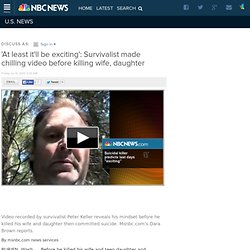
Msnbc.com's Dara Brown reports. By msnbc.com news services BURIEN, Wash. -- Before he killed his wife and teen daughter and retreated to a remote bunker in Washington's Cascade Mountains, Peter Keller recorded a chilling video explaining his mindset: He was bored. "It's getting to the point where just trying to live and pay bills and live as a civilian and go to work, that just freaks me out," the 41-year-old survivalist said in a video clip released Thursday by the King County Sheriff's Office. "It's actually more comfortable for me to think about living out here, robbing banks and pharmacies, just taking what I want for as long as I can. The Benjamin Franklin Effect « You Are Not So Smart#more-1459. The Misconception: You do nice things for the people you like and bad things to the people you hate.
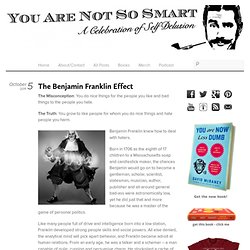
The Truth: You grow to like people for whom you do nice things and hate people you harm. Benjamin Franklin knew how to deal with haters. Born in 1706 as the eighth of 17 children to a Massachusetts soap and candlestick maker, the chances Benjamin would go on to become a gentleman, scholar, scientist, statesman, musician, author, publisher and all-around general bad-ass were astronomically low, yet he did just that and more because he was a master of the game of personal politics.
Like many people full of drive and intelligence born into a low station, Franklin developed strong people skills and social powers. All else denied, the analytical mind will pick apart behavior, and Franklin became adroit at human relations. Franklin’s prospects were dim. At 17, Franklin left Boston and started his own printing business In Philadelphia.
What exactly happened here? Let’s start with your attitudes. Primary Psychiatry: In Session with Dennis S. Charney, MD: Resilience to Stress. Column Dennis S.
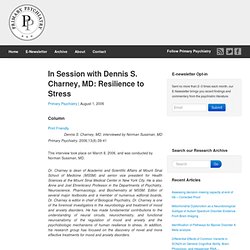
Charney, MD, interviewed by Norman Sussman, MD Primary Psychiatry. 2006;13(8):39-41 This interview took place on March 8, 2006, and was conducted by Norman Sussman, MD. Dr. What initially piqued your interest in the study of posttraumatic stress disorder (PTSD)? In the late 1980s, my Yale colleagues and I started work on PTSD at the Department of Veteran’s Affairs Medical Center in West Haven, Connecticut.
Our research was built upon basic science work by several scientists, most notably Robert Sapolsky, PhD, and Bruce S. Are there any consistent findings of physiologic or biochemical markers specifically for posttraumatic stress? There are findings that clearly are more common in patients with PTSD. Other replicated findings include a hyper-responsiveness of the brain norepinephrine system. How did you go from looking at the negative effects of stress to studying resilience? How can the research on resilience be applied in the treatment of patients with stress?
References. Not an Inanity: Special Forces Like SEAL Team 6 Are Indeed Special. There is a lot of buzz about SEAL Team 6 and rightly so.
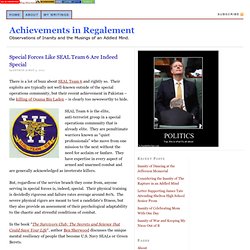
Their exploits are typically not well-known outside of the special operations community, but their recent achievement in Pakistan – the killing of Osama Bin Laden – is clearly too newsworthy to hide. SEAL Team 6 is the elite, anti-terrorist group in a special operations community that is already elite. They are penultimate warriors known as “quiet professionals” who move from one mission to the next without the need for acclaim or fanfare.
They have expertise in every aspect of armed and unarmed combat and are generally acknowledged as inveterate killers. But, regardless of the service branch they come from, anyone serving in special forces is, indeed, special. In the book “The Survivors Club: The Secrets and Science that Could Save Your Life“, author Ben Sherwood discusses the unique mental resiliency of people that become U.S. What seems to drive this resiliency in special forces personnel is a unique brain chemistry.